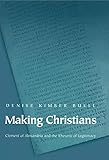Making Christians : Clement of Alexandria and the Rhetoric of Legitimacy / Denise Kimber Buell.
Material type: TextPublisher: Princeton, NJ : Princeton University Press, [2020]Copyright date: ©1999Description: 1 online resource (224 p.)Content type:
TextPublisher: Princeton, NJ : Princeton University Press, [2020]Copyright date: ©1999Description: 1 online resource (224 p.)Content type: - 9780691221526
- Apologetics -- History -- Early church, ca. 30-600
- Human reproduction -- Religious aspects -- Christianity -- History of doctrines -- Early church, ca. 30-600
- Kinship -- Religious aspects -- Christianity -- History of doctrines -- Early church, ca. 30-600
- RELIGION / History
- Alexander of Jerusalem
- Alexandria, Egypt
- Artemidoros
- Basilides
- Boyarin, Daniel
- Burrus, Virginia
- Callahan, Allen
- Castelli, Elizabeth
- Constas, Nicholas
- Delaney, Carol
- Diodorus Siculus
- Douglas, Mary
- Eilberg-Schwartz, Howard
- Eusebius of Caesarea
- Favorinus
- Gamble, Harry
- Gleason, Maud
- Gospel of Philip
- Gourevitch, Danielle
- Gregory of Nyssa
- Hall, Jonathan
- Harrison, Verna
- Herophilus
- Hippolytus
- Hopkins, Keith
- Irenaeus
- Isis, depictions as a nursing deity
- John Chrysostom
- Julius Cassian
- Kaster, Robert
- King, Karen
- Lange, Lynda
- Le Boulleuc, Alain
- Marcion
- Martin, Dale
- Musonius Rufus
- Origen
- Osborn, Eric
- Pagels, Elaine
- Paul of Tarsus
- Pearson, Birger
- Plotinus
- Porphyry
- Quatember, Friedrich
- Spanneut, Michel
- Therapeutrides
- apostasy
- eucharist
- gender: of children
- metaphor
- nursing
- religion: science and
- BR65.C66
- online - DeGruyter
| Item type | Current library | Call number | URL | Status | Notes | Barcode | |
|---|---|---|---|---|---|---|---|
 eBook
eBook
|
Biblioteca "Angelicum" Pont. Univ. S.Tommaso d'Aquino Nuvola online | online - DeGruyter (Browse shelf(Opens below)) | Online access | Not for loan (Accesso limitato) | Accesso per gli utenti autorizzati / Access for authorized users | (dgr)9780691221526 |
Frontmatter -- CONTENTS -- ACKNOWLEDGMENTS -- ABBREVIATIONS -- INTRODUCTION Origin Stories as Authorizing Discourse -- CHAPTER ONE Tracing Procreation: The Origins of Origin Stories -- CHAPTER TWO The Social Force of Metaphors for Procreation -- CHAPTER THREE Sowing Knowledge: Procreation and Pedagogy -- CHAPTER FOUR Defending Teaching Methods with Procreative Language -- CHAPTER FIVE "Few Are Like Their Fathers": The Rhetoric of Genealogy and Intra-Christian Polemic -- CHAPTER SIX Allegiance to the "True Father": Kinship Metaphors as Border Discourse -- CHAPTER SEVEN A Rhetoric of Christian Unity: Christians as Children of the Father of All -- CHAPTER EIGHT Paideia and the Paidagōgos -- CHAPTER NINE Perfect Children: Drinking the Logos-Milk of Christ -- CHAPTER TEN "The Milk of the Father": "Only Those Who Suckle This Breast Are Truly Blessed" -- CONCLUSION Reflections on the Future of Origin Stories -- SELECT BIBLIOGRAPHY -- INDEX OF ANCIENT PASSAGES CITED -- GENERAL INDEX
restricted access online access with authorization star
http://purl.org/coar/access_right/c_16ec
How did second-century Christians vie with each other in seeking to produce an authoritative discourse of Christian identity? In this innovative book, Denise Buell argues that many early Christians deployed the metaphors of procreation and kinship in the struggle over claims to represent the truth of Christian interpretation, practice, and doctrine. In particular, she examines the intriguing works of the influential theologian Clement of Alexandria (ca. 150-210 c.e.), for whom cultural assumptions about procreation and kinship played an important role in defining which Christians have the proper authority to teach, and which kinds of knowledge are authentic. Buell argues that metaphors of procreation and kinship can serve to make power differentials appear natural. She shows that early Christian authors recognized this and often turned to such metaphors to mark their own positions as legitimate and marginalize others as false. Attention to the functions of this language offers a way out of the trap of reconstructing the development of early Christianity along the axes of "heresy" and "orthodoxy," while not denying that early Christians employed this binary. Ultimately, Buell argues, strategic use of kinship language encouraged conformity over diversity and had a long lasting effect both on Christian thought and on the historiography of early Christianity. Aperceptive and closely argued contribution to early Christian studies, Making Christians also branches out to the areas of kinship studies and the social construction of gender.
Mode of access: Internet via World Wide Web.
In English.
Description based on online resource; title from PDF title page (publisher's Web site, viewed 27. Jan 2023)


